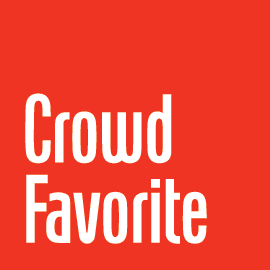Insights from CEO Karim Marucchi and COO Jason Rosenbaum
Today we’re joined by Karim Marucchi and Jason Rosenbaum, CEO and COO of Crowd Favorite respectively. Crowd Favorite was founded in 2007 by Alex King and acquired by VeloMedia in 2014. In the years since it has grown by leaps and bounds, working on digital initiatives with companies like Disney, ABC Television, and Facebook. In this fireside chat we’ll be exploring not just what makes Crowd Favorite tick but also where the digital world is going, what opportunities and challenges will appear, and what it means to take on big initiatives in an ever-changing landscape.
You’ve both worked for different companies in and around the agency sector. What about Crowd Favorite made you say, “ok, this is home?”
Jason Rosenbaum:
For me it was a chance to grow a winning team, a winning organization, from the ground up. Granted, early on it was touch-and-go there for awhile, but once we found our footing, gained the traction we needed, and stayed committed to growing responsibly, we’ve been on a steady upward trajectory ever since.
Karim Marucchi:
Jason was a client previously and that gave the two of us a great foundation to explore, “does this fit.” We worked together on the vision and Jason has done a great job in running with that. For me I very much appreciate that there are no days where I don’t like working here. That’s not to say we don’t have bad days sometimes, that’s true at every business. But I always enjoy working here, with this team, and these clients. Since I’ve been here the whole time I’m not sure there was ever a moment where this wasn’t “home.”
Even after all these years it’s wonderful to be able to say “this IS the company we want to build, we are still charting the path.”
Jason Rosenbaum:
Over time, we’ve put together an amazing team here – all of them have made it easy to call CF “home” over the last 9 years.
Karim Marucchi:
I think that’s the view each team member has, really. At least we work hard for it to be. That the people make this place easy to feel comfortable and the work itself is both interesting and rewarding.
The Benefits of Working With a Distributed Team
Your team is located all around the world. Recognizing that it’s smart to find talent where it lives, are there some other benefits to having a team in so many places?
Jason Rosenbaum:
There are many reasons why a distributed or remote team is beneficial, and I think the trend is weighting itself more and more to this as technology advances. For our clients, it means we have the ability to optimize our output without sacrificing quality. Said another way, we’re able to deliver more value in less time.
Karim Marucchi:
There are amazing technologists all around the world but it works well for us because we’re so focused on client services that we literally have someone available at most hours during the day, wherever the client is located, to be guiding projects and staying in touch as needed.
Jason Rosenbaum:
The most important and positive byproduct of our distributed team, in my opinion, is we highly encourage a collaborative approach to make the best possible decisions for ourselves and our clients. We believe the broader the spectrum of our Favoriteers’ backgrounds the better off we are at making the right calls. Having a non-geocentric team allows us to achieve that experiential diversity easier than if we were pulling candidates from a much more narrowed pool.
Karim Marucchi:
Totally agree. Each of us brings a different world view – literally – to the equation and it means we challenge assumptions and each other. Aside from that resulting in better work, I think it raises the bar for intellectual discussions as well.
People at Crowd Favorite view problems and solutions differently depending on their perspective, and having different perspectives lends itself well to new ideas.
Jason Rosenbaum:
A caveat to take away: distributed environments are not for everyone. It is important to bring on teammates who have experience in these types of environments, and then support and frame the environment with a communication workflow that mirrors that of a brick-and-mortar office as much as possible. Utilizing video conferencing tools and having a formal communication process for how and when to use each communication tool we have in house helps Crowd Favorite in times of hypergrowth. For example, five years ago we did two brick-and-mortar acquisitions within a six-month period and had to integrate those teams into a distributed work environment. Without a commitment to our tools and our processes this would have been impossible.
A Partner Focused on Business Goals & Challenges
You both often talk about how CF is a client services organization as opposed to a digital agency. Why is that a meaningful difference?
Jason Rosenbaum:
Simply put most digital agencies focus on the project, concentrating their efforts on the technical solution to fulfill a set of requirements. Client services organizations put more emphasis on the partnership, building digital programs for their clients instead, focusing on their organizational, operational, and financial goals and challenges.
So it’s more oriented on the results and outcomes, not just stacking more technology in just for the sake of it?
Jason Rosenbaum:
Absolutely. The technical solution becomes almost a byproduct of the experience with a client services organization. With a digital agency you’re getting a tactical vendor who can build you something, while with a client services organization you get a strategic partner that architects scalable solutions that solve your issues today by understanding what’s coming tomorrow.
But can’t every digital agency or marketing agency say that? “We’re great with clients…it isn’t just about the code”? Not trying to be difficult, but is there a difference here or is it just semantics?
Jason Rosenbaum:
Our differentiation lies in our approach – and it’s right there in our name.
[bctt tweet=”We are Crowd Favorite because we behave like a crowd favorite. We provide elite services for our clients in an approachable, accessible manner. – Jason Rosenbaum, COO, @CrowdFavorite”]
Oftentimes the experience for clients with digital vendors can be delivered in a cold and sometimes condescending way. We talk about this a lot – it’s a very hard thing to convince a stranger to give you money and time for something they probably don’t understand. And if by chance they have some understanding, they are by no means subject matter experts. So for us it’s all about trust and credibility. And I think that’s where we shine. Our commitment to gaining our clients’ trust is unrivaled, and the experience and value we provide in that endeavor is unmatched.
Karim Marucchi:
Absolutely, and if I may unpack that a little.
Jason Rosenbaum:
Certainly.
Karim Marucchi:
Client services, to me, is about being attuned to where the client needs us to “stand” for lack of a better word. Sometimes clients don’t know what they don’t know, so they count on us to lead them through their project as an educator, where we show what is possible. Sometimes they are better versed in the details of the project, but need the support to make bold decisions. In those scenarios, we serve the role of strategic partner. Sometimes they need us alongside, almost like a navigator to work together on the journey.
Client services isn’t just about focusing on outcomes and experiences, it’s about being adaptable to where the client can most benefit from what we bring to the table.
A Committed Team with Diverse Experiences and Perspectives
You’ve worked with both large brands and small on a wide range of projects, what is the one thing you think CF does better than anything else? Where are you really “world class?”
Jason Rosenbaum:
I’m biased but I’ll say our people. I often talk about this. There are a lot of great companies out there, many of whom offer a lot of the same services that we do here at CF. They make great products and deliver great services for their clients. And in an extremely saturated market, it’s easy to get drowned out a bit. So for us it’s all about trust and credibility. And I think that’s where we shine. Our commitment to gaining our clients’ trust is unrivaled, and the experience and value we provide in that endeavor is unmatched.
Karim Marucchi:
This goes back to how and where we’ve found talent. To a person, Crowd Favorite brings a different view of what’s possible to the conversation. It sounds simple, but we’ve deliberately recruited team members in new markets and with new experiences precisely for that reason. We’ve run into business and technology discussions over the years where a firm with less life diversity might be stumped. And for Crowd Favorite, we almost always have a Favoriteer who says, “Oh yeah, I’ve run into this before. Here’s one great way to address that.”
Looking Ahead To New, Evolving, and Emerging Technologies
Some other Favoriteers mentioned that they love how your processes are constantly evolving and improving. I took from that that they like the fact that structurally you’re not so grown up as to think everything is perfect and thus inflexible. Things like communication can be both a strength and an area of opportunity for getting even better. What do you think are some key areas of opportunity for CF to improve in the coming years?
Jason Rosenbaum:
Technologically speaking, I think the beauty of being in the digital space is that it changes, changes fast, and it doesn’t look like that’s going to end any time soon. I’d like to see CF focus more on emerging technologies, like AI, and integrate them more with our offerings to our clients. The world is becoming smaller, and those that are lean and mean can scale themselves in a way we’ve never seen before.
Karim Marucchi:
We have some long-standing relationships with clients who are seen in their industries as having sensational digital marketing initiatives. As an aside, I’m grateful and proud of the role we’ve played so far in driving those strategies forward. But many of those same companies are just now starting to view things like AI and VR with real interest. I agree that getting ahead, instead of playing catch-up, with this kind of technology is going to be a big part of our future. Frankly, I think agencies that don’t embrace new trends in the digital space may struggle.
Jason Rosenbaum:
That is the ultimate value of companies like ours to our clients – making sure we’re helping them scale to hit their potential every day. So anything we can do that allows a client to represent itself more efficiently, more dynamically, and more scalably is where I’d like to see us on the forefront.
The Impact of Open Source DXP for the Enterprise
Your work with WP Engine on building a Digital Experience Platform has been a big initiative for both companies. Many people don’t even understand what a DXP is. Why is this idea of DXP worthy of your regard and investment?
Karim Marucchi:
Simply put, a DXP is a more singular, more streamlined way of managing your digital marketing channels. For example, instead of having a website in one place and email marketing in another, held loosely together by technological duct tape and bailing wire, you instead have an integrated system that actually works properly. At scale, keeping content and contacts and attribution and analytics straight is a huge headache. A DXP abstracts all of that complication out so that real, meaningful work gets done.
Jason Rosenbaum:
I think we’ve been seeing the demands of the enterprise marketplace shifting over the last few years and WP Engine was one of the first to “get” the opportunity to bring something dynamic via Open Source software to that market.
Karim Marucchi:
Exactly. There have been DXPs for almost as long as there has been digital marketing. But many of those systems are super expensive and out of reach for many companies. And those that can afford them soon find themselves locked into painful contracts and maintenance costs with a mediocre ROI.
OK, but so what? Why is this initiative different for businesses compared to simply shopping around for existing platforms or solutions?
Jason Rosenbaum:
Being able to offer a best-in-breed ecosystem to the enterprise client at a fraction of the cost of licensed software alternatives will be a game-changer for any organization looking for the power and scalability of those closed platforms, without the rigidity and significant expense that comes with them.
Karim Marucchi:
Right. It isn’t just about reduced expense, it’s about the freedom, the possibility of having your DXP actually do what you need it to do for your company. I’ve often marvelled at how much software gets the user 80% of 90% of the way to where they want to be.
With a DXP built on Open Source technology the chances are greatly improved for organizations to get exactly what they need in a way that closed systems simply can’t or won’t allow.
Jason Rosenbaum:
At the end of the day, we found common ground with our friends at WPE knowing we’re in the business of providing value first and foremost, not technology.
Crowd Favorite Outlook on The Future of The Internet
What does the internet look like in 10 years for businesses and the enterprise?
Jason Rosenbaum:
I’m not afraid to say I have no idea. I don’t think anyone could have dreamed in 2009 we’d have what we have today, and in 1999 the same was probably true and so on and so forth.
Karim Marucchi:
Every company is a technology company now, and I think that’s different from 10 or 15 years ago. The width and depth of what’s possible online is still in a nascent stage. I don’t know the last time we encountered a company that was experiencing accelerating growth without making significant investments in their digital footprint.
Jason Rosenbaum:
I’ve spoken about the Internet and its evolution, the same as a child evolves into an adult. In the 2000s and 2010s, we were coming out of our teens and into our early adulthood. We felt physically great and all we saw was potential and all we had was optimism of what the Internet could be. But we’re in our mid 20s now, and some of the shine is coming off and like everything else created by humans, it can be used for good and bad. So now we have to deal with the reality of that world. I see a more regulated Internet in 10 years, but also a much more powerful Internet in 10 years.
That’s an interesting concept. More regulated yet more powerful. Not sure I disagree with you, but can you share how you arrived at that point of view?
Jason Rosenbaum:
Sure – the Internet reminds me a little of airplanes. And the founders of these internet companies, before they were huge, were like the Wright brothers. They were risk-takers, inventors, explorers, entrepreneurs, trailblazers to some degree. And when they started out all they cared about, ate, slept, and dreamt about, was flying an airplane. And eventually they got it to fly. And it worked. And then it worked again. And then it worked so well and it opened up so many possibilities it became clear that there were going to be a lot of planes in the air.
The FAA did not exist when the airplane was invented. And internet regulation does not exist today in the same fashion, but it is coming. Because more people are using this invention in ways that the original inventors of it could never have conceived of, and that is how these things go.
That’s an interesting concept. More regulated yet more powerful. Not sure I disagree with you, but can you share how you arrived at that point of view?
Jason Rosenbaum:
Correct. And while I am not in favor of too much outside involvement in the Internet or the companies that live on it, I do see inevitable regulation being a part of its maturation over the next decade.
Open Source Focused Projects in the Enterprise Space
Is there a recent site or digital project that you saw from afar that really caught your eye or made you say, “I wish we had the chance to work on that?”
Jason Rosenbaum:
Sure, but I’m not going to tell you which ones. (smiles)
Karim Marucchi:
When you’ve been doing this for as long as we have, you can’t help but see projects where you wish you’d had a chance to offer some ideas or input. We’re also not cynical people here, we actually really enjoy and appreciate the work a lot of our competitors are able to do. And I imagine in an honest moment many of them would admit that we do excellent work as well.
Jason Rosenbaum:
There are always opportunities that you wish you had done better with or had more of a chance to succeed. But we try and concentrate on finding the best partners we can first, and usually the quality of the projects follows. I can say I respect a lot of the work being done in the space currently. I think the digital agency space has matured, and as a result has become saturated. However, we’re seeing the evolution of what comes next after saturation, which is segmentation.
I think a lot of folks are doing great work that fits their particular ethos or core competencies and that is great because it means two things: one, there is enough work for all the quality agencies out there and two, our clients are getting optimal value with all of us as a result.
Karim Marucchi:
Not just segmentation, but specialization. That’s one of the first things we talk about when helping smaller agencies or freelancers or people just starting off in this space. Specialization is key. Yes it’s tempting to take on all the business you can, but owning your corner of the world is how you really start to grow. We work every day to make Crowd Favorite the best Open Source services organization for the enterprise on earth. It’s a line on the horizon we may never reach but I feel we’ve done well by saying, “this is where we are determined to win.” Why? Because when you have a heart issue you go to a cardiologist, not a general practitioner.
A Partner With Experience Collaborating With Internal Teams
What’s the iceberg in the water that you see for large organizations as they run faster and faster to full digital strategies? How would you suggest addressing that preeminent challenge?
Jason Rosenbaum:
A decade or so ago we saw companies in the midmarket and enterprise shedding their development and design resources. It’s somewhat cyclical because now many of them are trying to bring that back in house as they recognize and embrace how important their digital initiatives are.
While in some cases, this may make sense on their P&L, it has an enormous cost still to them on two key fronts: it puts more pressure on their internal administrative and operational people and processes, while also hiring a staff that may be able to build something, but can’t architect it. So for those organizations, I would say make sure you’re continuing to have strategic partners who provide true client services and not only digital production.
You want an agency partner who understands where your business has been, where it is, and where it’s going and can then translate that into a digital program, ensuring the internal team you’ve invested in is being utilized optimally with a focus on building for tomorrow as well as today.
Karim Marucchi:
The next evolution in digital for the enterprise will be a lot like traditional advertising was like back in the 60’s and 70’s where you had in-house resources that worked in partnership with outside firms to maximize ROI and get the best possible work.
As for an iceberg in the water it goes back to what we discussed earlier: if you are late to digital investments then you are in a position of vulnerability to competition.
An Open Source Focused Partner Delivers Flexibility & Scalability
Crowd Favorite very deliberately focuses on Open Source software for clients. How and why was the decision made?
Jason Rosenbaum:
I will defer to Karim on the “how”, as he had the foresight to make that decision. I inherited it when I came aboard in 2011.
Karim Marucchi:
There are many reasons and, frankly, they’ve changed over the years. I think at heart was the philosophy that the client ultimately knows what goals they are trying to reach so their tools, the software, should provide the flexibility to do exactly that.
Open Source software puts the user in control whereas with closed, proprietary systems it is the system in control. That’s always seemed backwards to me.
Jason Rosenbaum:
As for the “why”, there are terrific Open Source communities out there. And as I mentioned above I believe the best team is the most diverse team, so something like Open Source promotes that sort of inclusion and variety of backgrounds to contribute towards a common goal – and that works very well with our ethos here at Crowd Favorite. For our clients, I think the answer is even simpler: it’s scalable, it’s powerful, it’s secure, it’s pliable, and it’s cost effective.
If a company is struggling to understand how their website and digital applications fit in to their future, what would be your first piece of advice?
Karim Marucchi:
My first piece of advice would be to embrace that lack of knowledge as a chance to learn something interesting. I’m not much of a technologist myself but the online world is absolutely fascinating when it comes to how businesses can operate and thrive. If you spend time thinking about how to make your business more profitable, or a better place to work, or a better pillar of your community, then you’ll find that what you can accomplish with your website or applications will absolutely blow your mind.
Hover or focus to see the definition of the term.






